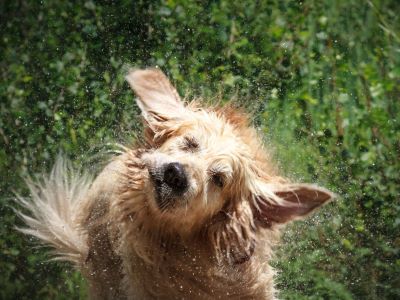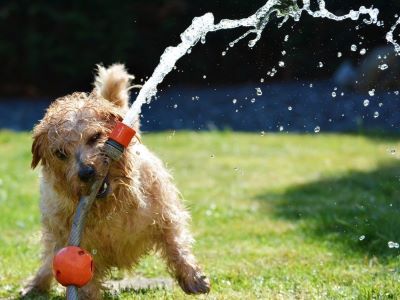Have you ever walked into your room and felt that weird smell on your face and you looked at your dog then your dog too looked at you like: “It is coming from me” Then you wondered “Why does my dog smell like fish?”
In this blog, we are going to understand the reasons behind this smell. Figuring this out is important for your dog’s health as well as there may be some underlying issues. So, without waiting any longer let’s begin!

Why Does My Dog Smell Like Fish?
Dogs sometimes have a particular odour coming from them, this can be a result of various things like their food, their health, and what things they have been exposed to (or rolled around on) outdoors.
Some dogs have a natural smell and some smell weird, like fish. This fishy smell comes from their health issues many times. Let’s understand some potential causes behind this fishy smell:
1. Skin Issues
Dogs can develop bacterial or fungal infections on their skin that lead to a bad smell. These infections thrive in warm, moist areas and can cause redness, itching, irritation, or pain. See your vet for a diagnosis. Treatment may involve shampoos, ointments, or medications.
“Seborrhea, a condition causing excessive oil production on the skin, can also make dogs smelly. It leads to oily, flaky skin and may be related to genetics, hormones, or other health issues” says the experts at VCA Hospitals
See your vet to determine the cause. Treatment can include special shampoos, dietary changes, or medications. To help prevent smelly skin issues:
- Bathe your dog regularly with a mild shampoo
- Feed a nutritious diet to support skin health
- See your vet quickly if symptoms persist or worsen

Understanding and properly treating skin conditions can greatly improve your dog’s comfort and smell. Always consult a vet for a precise diagnosis and treatment suggestions.
2. Anal Gland Issues
Dogs have anal glands near their anus that can sometimes get blocked or infected and give off a fishy smell. Signs of an anal gland issue include scooting on the ground, licking or biting near the anus, or swelling and redness around the area[1].
See your vet, who can check the anal glands and express them (manually clear out the fluid) if needed. Regular vet check-ups for expressing the glands can help prevent smelly issues for dogs prone to anal gland problems.
3. Diet-related Factors
What dogs eat can affect how they smell. Fish-based food or low-quality, expired food may make a dog’s coat greasy and give them a fishy odour.
Signs of diet-related smell issues include a noticeable change in body odour and a dull, greasy coat. To prevent diet-related smells:
- Choose a high-quality, balanced dog food
- Check expiration dates and store carefully
- Slowly change to any new foods
- Make sure your dog has access to fresh water
- Add some variety to your dog’s meals, but watch for any reactions

4. Yeast Overgrowth
Yeast overgrowth on a dog’s skin can cause a fishy smell. Exposure to seawater or fish can also make a dog smelly.
Signs of a yeast infection include greasy fur, itchy red skin, and inflammation[2]. See your vet for a diagnosis. Treatments can include antifungal medications, medicated baths, or diet changes. To help control yeast and smells:
- Bathe your dog regularly with dog shampoo
- Keep your dog dry, especially in folds and moist areas
Treating yeast infections and other skin issues can help get rid of fishy smells and keep your dog more comfortable.
5. Environmental Factors
Dogs can pick up fishy smells from their environment, like after swimming in fishy-smelling water. Exposure to things like seaweed, fish, or salty water can make a dog’s fur smelly.
There may be fishy smell in their fur or maybe their fur is wet after swimming or water play. To help with fishy smells:
- Rinse and dry thoroughly after water activities
- Limit time around fishy-smelling areas
- Bathe regularly with dog shampoo
- Wash bedding to remove odours
- Brush coat to get rid of debris
Controlling exposure to smelly environments and bathing when needed can help keep your dog fresh.
How Can You Address This Smell?
Taking professional advice from your vet is important. Diagnosis by a vet is important to identify and treat the root cause of the fishy smell. Professional advice ensures proper diagnosis, leading to targeted and effective solutions.

Schedule a vet visit if you notice constant or worsening odours. These tests may include skin scrapings, blood work, or imaging to specify underlying health issues. Let’s what else be done:
1) Proper Grooming
Choose a mild and dog-friendly shampoo to bathe your dog regularly, promoting overall cleanliness. Pay attention to places prone to smell, such as the coat and paws.
If your dog scoots or shows discomfort, a vet can express the anal glands to clear the blockages, go to regular check-ups for this.
2) Dietary Adjustments
Choose high-quality and balanced dog food with the necessary nutrients. Slowly change to a new food to avoid digestive issues and give your dog time to adjust.
If fish in the diet is suspected then you can find another protein substitute like chicken or beef.
3) Environmental Management
Recognize and reduce exposure to fishy substances, especially during walks or outdoor play. Avoid letting your dog roll or eat strong-smelling materials. Wipe your dog down after outdoor adventures to remove potential smells.
Consistently clean their paws to prevent tracking in unpleasant scents. Maintain a routine grooming schedule. Provide a clean and comfortable sleeping area for your dog. Monitor changes in behaviour and odour and solve them quickly.

Prevention Strategies
Here are some prevention strategies you can follow to get rid of the fishy smell:
- See the vet regularly even when your dog is healthy. This allows the vet to provide preventative care and catch any issues early. Discuss recommended vaccines and parasite prevention.
- Feed a high-quality, balanced diet to support good health and skin condition. Check with your vet for diet advice, especially for your dog.
- Groom regularly, brush fur, trim nails, bathe with dog shampoo, clean ears, and brush teeth. Good hygiene prevents skin issues and smells.
- Monitor your dog’s skin and anal glands. Look for signs of irritation, redness or discomfort. Address any issues promptly by seeing the vet.
- Make sure your dog has access to fresh water, regular exercise, and a clean living space to support overall health and prevent problems.
Staying on top of care, diet, hygiene and monitoring your dog’s health are good ways to prevent and address smelly issues.
FAQs
❔Why Does My Dog Smell Like Fish and Have a Lot of Discharge?
BV is responsible for the fishy smell most commonly associated with unpleasant vaginal odours. The fishy smell may be especially strong after sex. Another common symptom to look out for with BV is a grey or greyish-white discharge. Trichomoniasis: A sexually transmitted infection caused by a parasite.
❔How Do I Get Rid of the Fishy Smell on My Dog?
These tips will help you get rid of the fishy smell altogether: Bath your dog as often as once a week. Use pre-moistened dog wipes around your dog’s mouth and hindquarters daily. Wash your dog’s bedding once per week. Use a safe cleaning and odour-eliminating solution designed to remove strong pet odours.
❔Why Does My Dog Smell Like Fish?
Normally, these anal glands are expressed during a bowel movement. You may not detect the scent if your dog’s stool is regular. However, when these glands become infected, impacted, or too full, you will smell the fishy secretions, indicating the need for medical intervention.
❔Can Dogs Express Their Glands by Licking?
Dogs lick at the area to relieve discomfort and “clean” areas with their saliva. If they’re doing it more than usual, It might be the cause of a larger issue. Dogs can typically express their anal glands themselves, but if they can’t, it can mean that the smelly fluid inside is built up to the point of discomfort.
❔Is It Painful to Express a Dog’s Glands?
It is much easier to express your dog’s anal glands if you have someone to help you gently restrain your dog as the expression is often uncomfortable (though not painful unless there is an infection or obstruction) and your dog may feel some pressure while you are pushing on the glands.
Conclusion
In conclusion “Why does my dog smell like fish?” Your dog may smell fishy due to various health concerns. These include skin infections, yeast overgrowth, allergies, diet problems, and clogged anal glands.
This may get worse with time so it is better to solve this quickly. If you feel confused at any point then visit your vet, they may advise you on the right treatment and the reasons behind this.
Remember it is important to make your dog feel comfortable and clean after all a healthy dog is a happy dog!
Reference:
- Rubin, S. I. (2023, December 5). Disorders of the rectum and anus in dogs. MSD Veterinary Manual.
- Aaron, D. M. (2023, December 6). Candidiasis (Yeast infection). MSD Manual Consumer Version. | MSD



